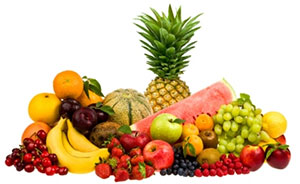
Fructose is mainly found in fruit and fruit juices.
Since especially pure fructose is poorly absorbed from the intestines in large amounts, these symptoms usually improve if you avoid foods that are very rich in fructose or only consume small amounts.
Some people often instinctively develop an aversion to very fructose-rich foods.
If fructose is absorbed in small amounts and in combination with glucose (=dextrose), the absorption from the intestine usually improves and fewer complaints occur.
Sorbitol (E420), on the other hand, which is contained in certain types of fruit, diabetic products and some sugar-free sweets (sugar, chewing gum), worsens absorption and thus worsens the symptoms.
Sugar additives such as mannitol (E421), isomalt (E953) or xylitol (E967), maltitol (E965) which are contained in chewing gum or sugar have a similarly unfavourable effect as sorbitol.
Multiple fructose such as oligiofructose and inulin have also recently been found more frequently in probiotic foods such as yoghurts.